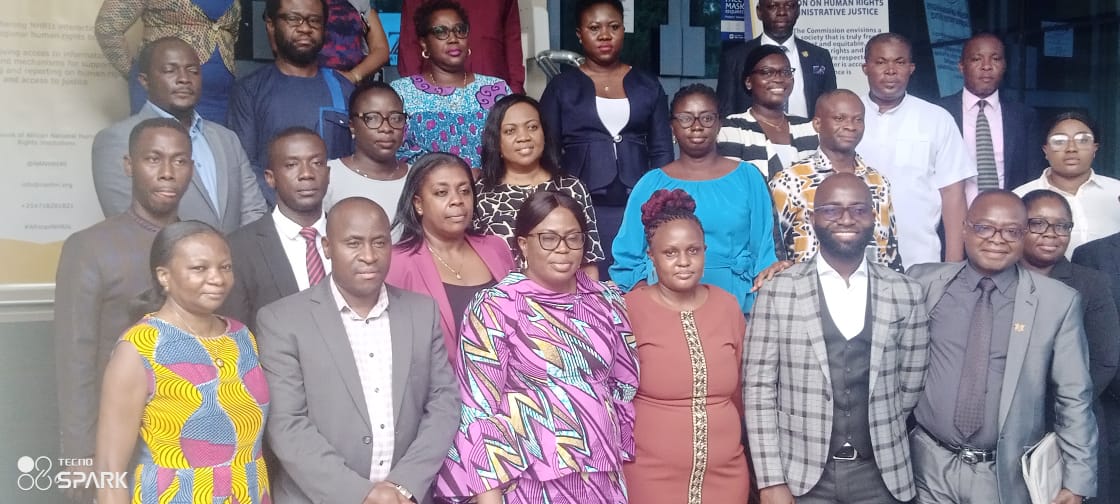Be courageous to report cases of rights abuse – CHRAJ
The Deputy Commissioner of Commission on Human Rights and Administration Justice CHRAJ, Ms Mercy Larbi, has advised Ghanaians especially, women and vulnerable persons to eschew fear and report cases of domestic violence and other forms of rights abuse against them for assistance.
According to the Commission, the constitution guaranteed equal basic rights and responsibilities for all citizens, including women and vulnerable person’s and urged them not to allow their rights to be trampled on.
She further charged the people not to wait for the issues to happen for them to go and report but take steps to rather sensitize everybody in the community to be aware and avoid perpetuating them.
The Commission on Human Rights and Administrative Justice (CHRAJ) Deputy Commissioner, also called on Ghanaians to take keen interest in the constitutional provisions on their rights and stand up to them.
“It tasked all to religiously read the 1992 Constitution of Ghana, sensitize others on it, demand their rights, and protect the rights of others. Rights go with responsibilities so while we demand our rights we must do well to respect the rights of other people,” she said.
The Deputy CHRAJ boss, gave the adviced at the opening ceremony of the Training on Litigation and Engagement with Africa Regional Human Rights and Treaty Bodies for CHRAJ and selected CSOs was held at Best Western Premier Hotel in Accra.
The workshop brought together more than 25 staff members of the CHRA] and civil society organisations (CSOs) for a training on litigation and other forms of engagements with sub-regional and regional human rights treaty bodies.
This training Is based on a study by NANHRI of 2019, which established that most national human rights institutions (NHRIs) in Africa have minima! interaction with the sub-regional and regional human rights treaty bodies in securing remedy for human rights violations.
Although CHRA] has sought remedy for human rights violations through its mandate and a few cases via national courts, the institution has seldom approached the regional human rights bodies.
Furthermore, the training seeks to consolidate and identify opportunities for collaboration between CHRA] and CSOs in not only engaging the regional human rights treaty bodies, but also following up on implementation of the recommendations and decisions of the regional bodies for the benefit of the rights holders.
According to her, Since attainment of independence in 1957, Ghana has become party to numerous International, Africa and Regional human _ rights instruments.
Ghana has incorporated some of these international laws into laws, it has amended some existing laws to include these international laws. Article 40 of the 1992 constitution obliges the government to promote respect for international laws, treaty obligations and settlement of international disputes by peaceful means and adhere to the principles enshrined in the organization which the country is a member.
She added that the Supreme Court of Ghana has held in some cases that the principles of international instruments relating to fundamental human rights are enforceable to the extent that they fit into the article 33(5) of the constitution which allows the courts to rely on other human rights principles in addition to those specially set out in chapter 5 of the constitution dealing with fundamental human rights.
In the lights of article 33(5), she said the door is open for courts in appropriate circumstances, to apply international instrument relating to human rights which have not been expressly incorporated into national laws in order to determine human rights issues.
Commissioner Ms Mercy Larbi, alluded that the enforcement of the guaranteed human rights under the Ghana Constitution is placed under the jurisdiction of the High Court. Article 33(1) of the Constitution provides that any person alleging that a provision of the Constitution on fundamental human rights and freedoms has been, is, or is likely to be contravened in relation to him or her, may apply to the High Court for redress.
Where the case involves interpretation and enforcement of the Constitution, the Supreme Court is vested with jurisdiction under articles 2(1) and 130. It is under these provisions that human rights litigation may be brought before the courts for adjudication.
This to her, the Commission has engaged in litigation before the national courts in executing its mandate to promote and protect fundamental human rights of all person in Ghana but has not engage in litigation before the Africa regional treaty bodies and therefore makes this training very important and crucial to enhance the understanding of the key African human rights treaties as well as to build the capacity of staff to engage with African Regional human rights treaty bodies.
She believes that the collaboration between CHRAJ and NANHRI would Significantly contribute to promotion, protecting and preventing human rights violation in Ghana which include notably arbitrary detention, torture and other cruel inhuman and degrading treatment meted out to the vulnerable members of our society especially women and children.
“We all know that the cost of human nghts vrolation Ghana and Africa is huge and this must be worrymg to us. Thus fighting human rights violation in Ghana must occupy the centre stage if we are to improve the lives of our people.”























































